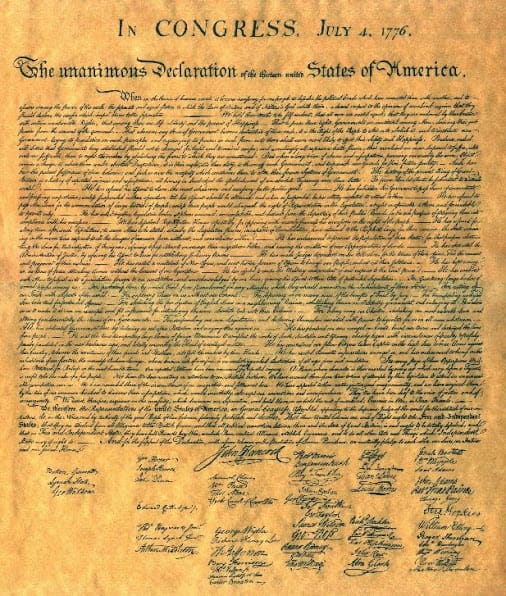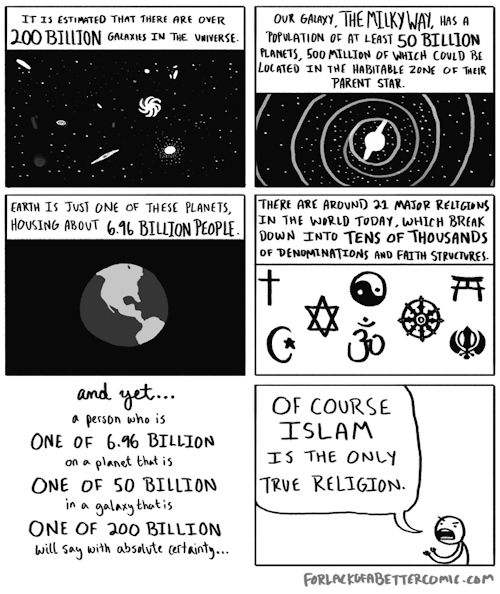Patriotism gets a bad rap in a lot of quarters because it so easily elides into nationalism and jingoism. We've seen that historically, and it's never a good thing, but I think it's also not a good thing when we lose connection with our nation and its ideals — not in a "neener, neener, we're bigger and badder than you" kicking-sand-in-the-face kind of way, but in a "here's what we believe in, here's what we are willing to live and die for" kind of way.
I believe in America, and its ideals. We fall short — waaaaaay short — of those ideals far too often, and are far too often unwilling to admit when we do so. And our pride in those lofty ideals, our falling short, and our denial about it, can all lead to just anger and disillusionment, at home and abroad.
But those ideals, epitomized in so many ways by the Declaration of Independence, remain. And as long as they remain something that we aspire to — and protest for, and fight for, and admit where we've turned away from them and strive to do better — then this Independence Day holiday will have meaning.
Liberty. Equality of all in rights. The freedom to pursue our lives as we see fit, subject only to not stepping on each other in doing so. And that we are all in it together as a nation, pledging, like the signers, our Lives, our Fortune, and our Sacred Honor.
I spent an inordinate amount of time on my quotation site (http://wist.info) this morning, finding five new quotes to go for the day. Here they are.
"There is not a liberal America and a conservative America — there is the United States of America. There is not a black America and a white America and Latino America and Asian America — there’s the United States of America."
— Barack Obama (b. 1961) American politician, US President (2009- )
Keynote speech, Democratic National Convention (26 Jul 2004)
"In no country is there so much devolving upon the people relating to government as in ours. Unlike any other nation, here the people rule, and their will is the supreme law. It is sometimes sneeringly said by those who do not like free government, that here we count heads. True, heads are counted, but brains also."
— William McKinley (1843-1901) US President (1897-1901)
Speech, Woodstock, Connecticut (4 July 1891)
"July 4, 1776 was the historic day on which the representatives of three millions of people vocalized Concord, and Lexington, and Bunker Hill, which gave notice to the world that they proposed to establish an independent nation on the theory that all men are created equal, that they are endowed by their creator with certain inalienable rights, that among these are life, liberty, and the pursuit of happiness. The wonder and glory of the American people is not the ringing Declaration of that day, but the action then already begun, and in the process of being carried out, in spite of every obstacle that war could interpose, making the theory of freedom and equality a reality."
— Calvin Coolidge (1872-1933) American lawyer, politician, US President (1925-29)
Equal Rights (1920)
"Our nation was founded to perpetuate democratic principles. These principles are that each man is to be treated on his worth as a man without regard to the land from which his forefathers came and without regard to the creed which he professes. If the United States proves false to these principles of civil and religious liberty, it will have inflicted the greatest blow on the system of free popular government that has ever been inflicted."
— Theodore Roosevelt (1858-1919) US President (1901-1909)
“Americanism,” speech to the Knights of Columbus, New York (12 Oct 1915)
"I am well aware of the Toil and Blood and Treasure, that it will cost Us to maintain this Declaration, and support and defend these States. Yet through all the Gloom I can see the Rays of ravishing Light and Glory. I can see that the End is more than worth all the Means. And that Posterity will triumph in that Days Transaction, even although We should rue it, which I trust in God We shall not."
— John Adams (1735-1826) US President (1797-1801)
Letter to Abigail Adams (3 Jul 1776)
A happy and safe Fourth of July to all.









